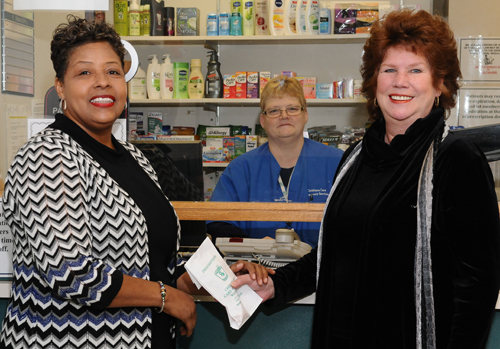Health coaches provide lifeline to patients who lack health insurance


Margaret Graber can breathe easier now that she doesn’t have to worry about how she will pay for her inhaler and other prescription medications.
She’s one of a growing number of uninsured or underinsured patients who found a lifeline through the Christiana Care Health Coach Program, part of the Center for Community Health in the Department of Family and Community Medicine.
Carlette Dickerson, a Pharmacy program coordinator, works as a link between Graber and several pharmaceutical companies to get the 54-year-old Felton woman the prescription drugs and medical devices she needs to treat a respiratory condition, heart problems and high cholesterol.
“The program is a life saver,” Graber says. “Before Carlette got me help, I felt like a ticking time bomb.”
When Dickerson began working with the Health Coach Program two years ago, she helped about 50 patients get prescriptions each month. These days, far more people need assistance. Dickerson now serves about 90 patients a month, most of whom require several medications. She has worked with patients who have as many as 15 prescriptions.
“Some people have lost their jobs,” she says. “Some people have no income at all.”
Caring for neighbors regardless of their ability to pay is part of The Christiana Care Way. Helping patients to get the medications they need can control or prevent serious illnesses. It also relieves the stress involved with ongoing concerns about paying for medicine.
“I love helping people,” Dickerson says. “That is my mission at Christiana Care.”
Graber, who cares for her disabled husband, hasn’t had health insurance for three years. She could not afford to pay out-of-pocket for her medications, which cost nearly $2,000 each month.
“When I thought about the expense of my medicines, I felt absolutely overwhelmed,” she said. “I could not possibly have handled a bunch of paperwork.”
Dickerson helps Graber and other patients to fill out applications to various drug makers, requesting free pharmaceuticals. She also documents the patient’s inability to pay. Some patients cannot read or write, and Dickerson completes the paperwork for them.
Once patients get in the loop, obtaining their medicines couldn’t be easier. Patients can receive free medications for up to one year before they need to reapply. In most cases, prescriptions are delivered directly to the patient’s home. Some drugs are dispensed at the hospital, where patients pay a $5 handling fee.
Since she is getting her medications on a regular basis, Graber feels better, physically and emotionally. She takes her prescription drugs as instructed by her doctor. She doesn’t worry any more.